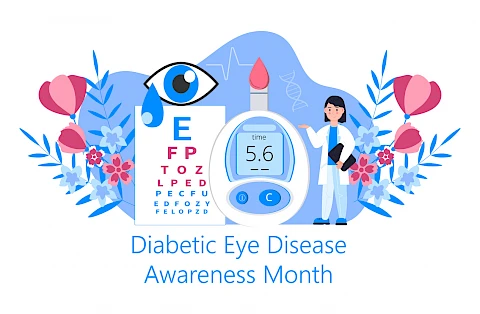
November marks Diabetic Eye Disease Awareness Month, a timely reminder of the importance of vision health, especially for older adults with Diabetes Mellitus. Excessive blood sugar exposure over time can lead to insulin resistance, which can eventually affect eyesight. As a caregiver, you play a vital role in supporting optical wellness, especially with diabetic eye disease in seniors.
The Basics of Diabetic Eye Disease in Seniors
Insulin resistance can lead to vision problems, especially in elderly relatives, due to their slower metabolism. Knowing about the following health issues is crucial for advocating effective care and prevention strategies:
- One common condition is diabetic retinopathy, where high blood sugar levels damage the blood vessels in the retina.
- Glaucoma, another condition, occurs when increased pressure in the eye damages the optic nerve.
- Cataracts, which cause lens clouding, are more likely to develop in people with insulin resistance.
Scheduling Regular Eye Check
Routine vision exams are vital for early detection of disorders related to hyperglycemia. They allow for timely intervention, potentially slowing or preventing vision loss. Experts recommend that older adults with insulin resistance have a comprehensive dilated eye exam at least once a year. As a caretaker, you can help by coordinating these appointments and ensuring follow-ups are attended. Keep track of these dates and set reminders so that vision health remains a priority.
Managing Blood Sugar Levels
Blood sugar levels directly affect eye health. Poorly controlled blood sugar can lead to or accelerate vision problems. Encouraging your loved one to maintain stable blood sugar levels is critical. This involves a balanced diet, regular exercise, and adherence to prescribed medications. Family guardians can assist with meal planning, encourage physical activity, and ensure that medication schedules are followed consistently.
Recognizing Signs of Vision Changes
Being vigilant about any changes is necessary. Common symptoms of optical disorders related to insulin resistance include :
- blurred eyesight
- seeing spots or floaters
- sudden vision loss
Encourage your loved one to report any changes, no matter how minor they may seem. Keeping a simple diary or log of these changes can be helpful for medical consultations. If any alarming symptoms arise, seek medical advice promptly. Early intervention can make a significant difference.
Collaborating With Healthcare Teams
A comprehensive approach to vision health involves working with various healthcare professionals. This team may include your loved one's primary care doctor, endocrinologist, and ophthalmologist. Share your observations and concerns with professionals to ensure coordinated help for your loved one. Encourage open dialogue between your senior and their healthcare team to ensure adequate adherence to treatment.
Enhanced Support and Guidance for Those With Insulin Resistance
Proper management of diabetic eye disease in seniors involves staying proactive and supportive to help maintain their eyesight and quality of life.
Do you need more assistance caring for an elderly loved one with trouble with hyperglycemia or other age-related health challenges? If you need personalized caregiving support, contact Senior Helpers Fort Lauderdale. We're here to assist families in Fort Lauderdale, Pompano Beach, and Coral Springs with compassionate and expert care.